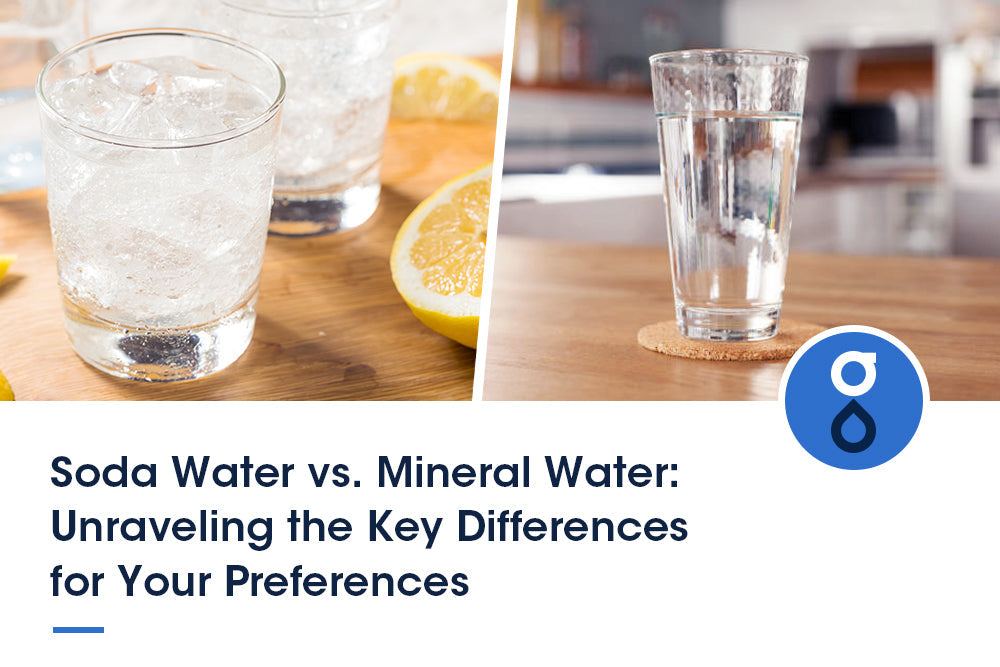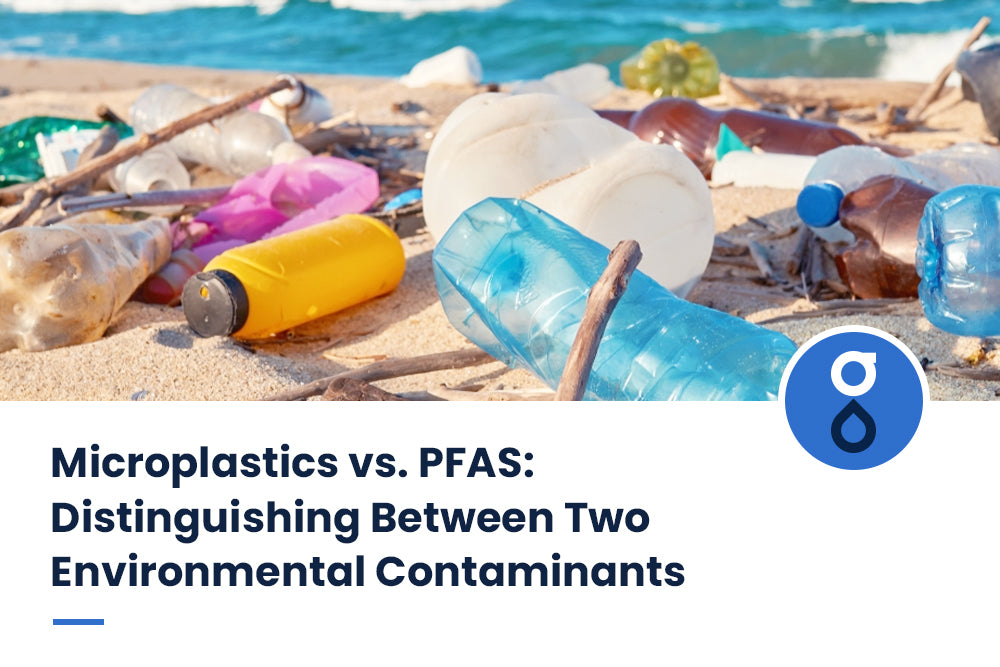Table of Contents:
Overview of soda water and mineral water
Soda water VS mineral water: decoding the major differences
Soda water VS mineral water, which`s better?
FAQs
Conclusion
If you're trying to stay hydrated and maintain a healthy lifestyle, you might wonder whether soda or mineral water is the better choice. While both types of water can quench your thirst, they have some significant differences that you might need to be aware of. In this article, we'll decode the considerable differences between soda and mineral water, so you can decide which is right for you.
Overview of soda water and mineral water

A brief overview of soda and mineral water reveals their distinct characteristics and properties. Soda water, also known as carbonated water, is a type of water that contains carbon dioxide gas. This fizzy and bubbly drink is often used as a mixer for cocktails and other beverages. It can be made artificially or naturally but is more commonly used in commercial soda water production. On the other hand, mineral water is sourced from natural springs or wells and contains various minerals and trace elements. It's considered a healthier alternative to regular tap water and is often marketed as such. Mineral water may also come in still or sparkling varieties.
Soda and mineral water undergo a bottling process before being sold to consumers. However, the sustainability of their production and bottling practices is a significant issue. While some companies prioritize environmentally-friendly packaging and production methods, others don't. As a consumer, it's essential to be aware of the impact of your purchasing decisions on the environment.
Soda water VS mineral water: decoding the major differences
Do you want to know the difference between soda water and mineral water? Well, let's start with taste and flavors.
Taste and flavors

Regarding taste and flavors, soda and mineral water couldn't be more different. Here are some key differences to help you distinguish between them:
- Soda water flavors are typically artificial and sweet, ranging from fruity to spicy. On the other hand, mineral water taste is characterized by its natural mineral content, which can give it a slight metallic or earthy aftertaste.
- Carbonation effects are also different between soda water and mineral water. Soda water is heavily carbonated, providing a sharp and bubbly sensation in the mouth. Conversely, mineral water is lightly carbonated, making it a more subtle and refreshing option.
- Health implications are another essential factor to consider. Soda water may contain added sugars or artificial sweeteners, which can negatively affect your health. Conversely, mineral water is a natural and healthy alternative that can provide essential minerals like calcium and magnesium.
- Consumer preferences also play a role in choosing between soda and mineral water. Some people enjoy the sweet and fruity flavors of soda water, while others prefer the natural taste of mineral water. It ultimately comes down to personal preference and what you want in a drink.
- Lastly, it's important to note that soda water can be used as a mixer in cocktails, while mineral water is often enjoyed on its own or with a slice of lemon or lime.
Carbonation levels

Get ready to experience the refreshing fizz of carbonation levels in your favorite bubbly beverage. Carbonation levels are crucial in distinguishing between soda water and mineral water. While soda water has artificially added carbonation, mineral water's carbonation is naturally occurring. The carbonation levels in these two beverages can also vary depending on taste preferences, serving temperature, and health effects.
Soda water tends to have higher carbonation levels compared to mineral water. However, this can vary depending on the brand and serving temperature. Some people prefer the intense fizz of soda water, while others enjoy the subtle bubbles of mineral water. Popularity trends also play a role, as some regions like one. Ultimately, the choice between soda and mineral water comes down to personal taste preferences and the desired health effects.
Dissolved solids

You may be surprised to discover the hidden ingredients that lurk in your favorite carbonated drinks, like dissolved solids that can make or break your beverage experience, much like the salt in a recipe can make or break a dish. Mineral water typically has higher levels of dissolved solids, which can affect the taste and water quality. These dissolved solids come from the minerals and trace elements found in natural springs and are not removed during filtration.
However, these minerals also provide hydration benefits, which can make mineral water a preferred choice for some individuals. Taste preference also plays a role in choosing between soda water and mineral water, with some people enjoying the clean, crisp taste of soda water. In contrast, others prefer the slightly mineral taste of mineral water.
Nutiritional value
The nutritional value of carbonated beverages can vary depending on the type of drink and its ingredients. Regarding soda water and mineral water, the latter is often considered the healthier choice. Mineral water contains minerals like calcium, magnesium, and potassium, which are essential for our bodies. These minerals offer hydration benefits and can help maintain the pH levels in our bodies. Additionally, mineral water has fewer calories than soda water, making it a better option for people watching their calorie count.
However, it's important to note that drinking habits play a crucial role in determining the overall nutritional value of carbonated beverages. Consuming excessive amounts of mineral water can lead to an overload of minerals, harming our health. On the other hand, soda water may contain artificial sweeteners and other additives, harming our health. Therefore, it's important to consume both types of drinks in moderation and read the labels carefully to understand their mineral content and calorie count.
Health benefits

Soda water and mineral water offer unique benefits for the body. Drinking soda water can promote digestion and alleviate stomach ailments, such as nausea and bloating. On the other hand, mineral water contains various natural minerals that contribute to overall health and well-being. Mineral water is sourced from natural springs and is rich in minerals like calcium, magnesium, and potassium. These minerals are essential for maintaining healthy bones, teeth, and muscles.
Additionally, the dissolved solids in mineral water can contribute to optimal hydration and support kidney function. The natural alkaline properties of mineral water may also help balance the body's pH levels and prevent acidity-related health issues. Each mineral found in mineral water offers its unique health benefits. Calcium contributes to healthy bones and teeth, while magnesium plays a role in muscle and nerve function. Potassium is essential for regulating blood pressure and supporting heart health. Zinc is critical for boosting the immune system, and iron contributes to healthy blood flow and oxygenation.
Soda or mineral water can be a healthy alternative to sugary sodas or chlorinated tap water. The carbonation in soda water can help ease stomach discomfort and promote digestion. Additionally, soda water is a calorie-free choice that can aid in weight management and overall health. Incorporating soda and mineral water into your daily life can have numerous health benefits. Soda water can alleviate stomach issues, while mineral water can provide essential minerals to support overall health and well-being.
Soda water VS mineral water, which`s better?
When choosing between soda water and mineral water, you may wonder which is the better option. Both are bottled options that can help you stay hydrated, but they have different properties that set them apart.
Soda water is carbonated and usually contains added flavors, while mineral water comes from natural springs and contains minerals like calcium and magnesium. Regarding hydration levels, mineral water is typically the better choice. Since it comes from natural sources, it has various minerals that can benefit your body.
On the other hand, soda water may contain added sugars or artificial sweeteners that can actually dehydrate you, except you make it by using your own soda makers like Sodaology. Additionally, the carbonation in soda water can make you feel full and bloated, making it harder to drink enough water throughout the day.
Industry trends and consumer preferences have also started to shift towards more eco-friendly options. Mineral water has a minor environmental impact since it comes from natural sources and doesn't require the same processing and packaging as soda water. Many consumers are also becoming more health-conscious and are opting for natural, unflavored mineral water over sugary soda water options. In summary,
while soda and mineral water have unique properties, mineral water is generally considered the healthier and more environmentally-friendly option. So next time you decide between the two, consider reaching for a refreshing bottle of mineral water instead.
FAQs
What is the history of soda water and mineral water?
Mineral water, naturally carbonated and contains various minerals and nutrients, has been prized for its health benefits since ancient times. On the other hand, soda water - carbonated or club soda - was first produced in the late 1700s to make water more palatable. Today, both types of water remain popular and have cultural significance in various parts of the world.
Can soda water or mineral water help with digestion or other health issues?
Soda and mineral water can offer some benefits regarding your gut health and overall well-being. While soda water may appeal more to those looking for a fizzy drink, mineral water can offer added nutrient content. Both options can also aid in hydration, which is crucial for weight management and overall health.
Are there any environmental or sustainability concerns with the production and packaging of soda and mineral water?
Plastic waste is a significant issue in the bottled water industry, regardless of whether the water is carbonated or not. Many companies have started using eco-friendly alternatives like biodegradable or plant-based plastics, but recycling methods still have a long way to go.
Conclusion
So, there you have it! You now know the major differences between soda water and mineral water. While both may be carbonated, soda water contains added flavors and sweeteners, while mineral water is sourced naturally from underground springs and contains beneficial minerals.
When it comes to which is better, it ultimately depends on your personal preferences and health goals. If you're looking for a low-calorie alternative to sugary soda, soda water may be your go-to. But if you're seeking the beneficial minerals found in natural spring water, go for mineral water. Either way, both options can be a refreshing and hydrating addition to your day.
















